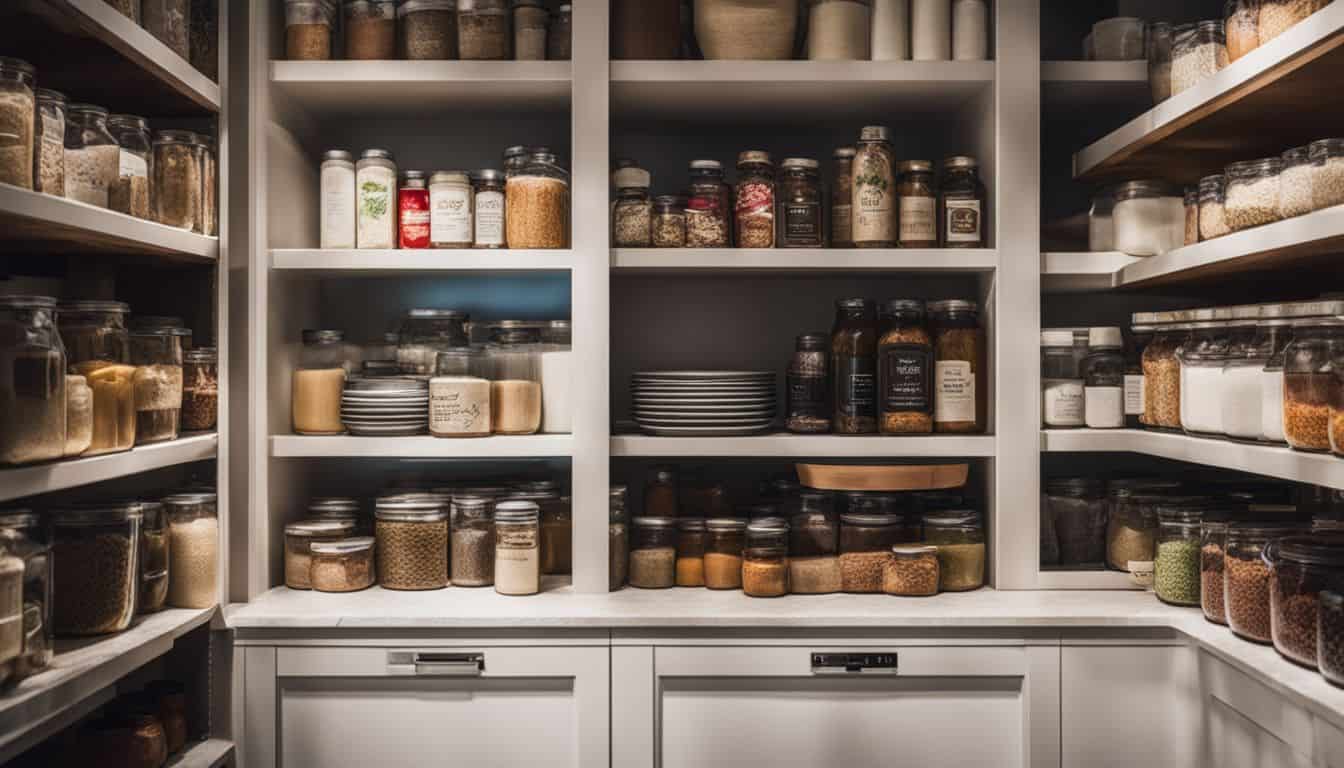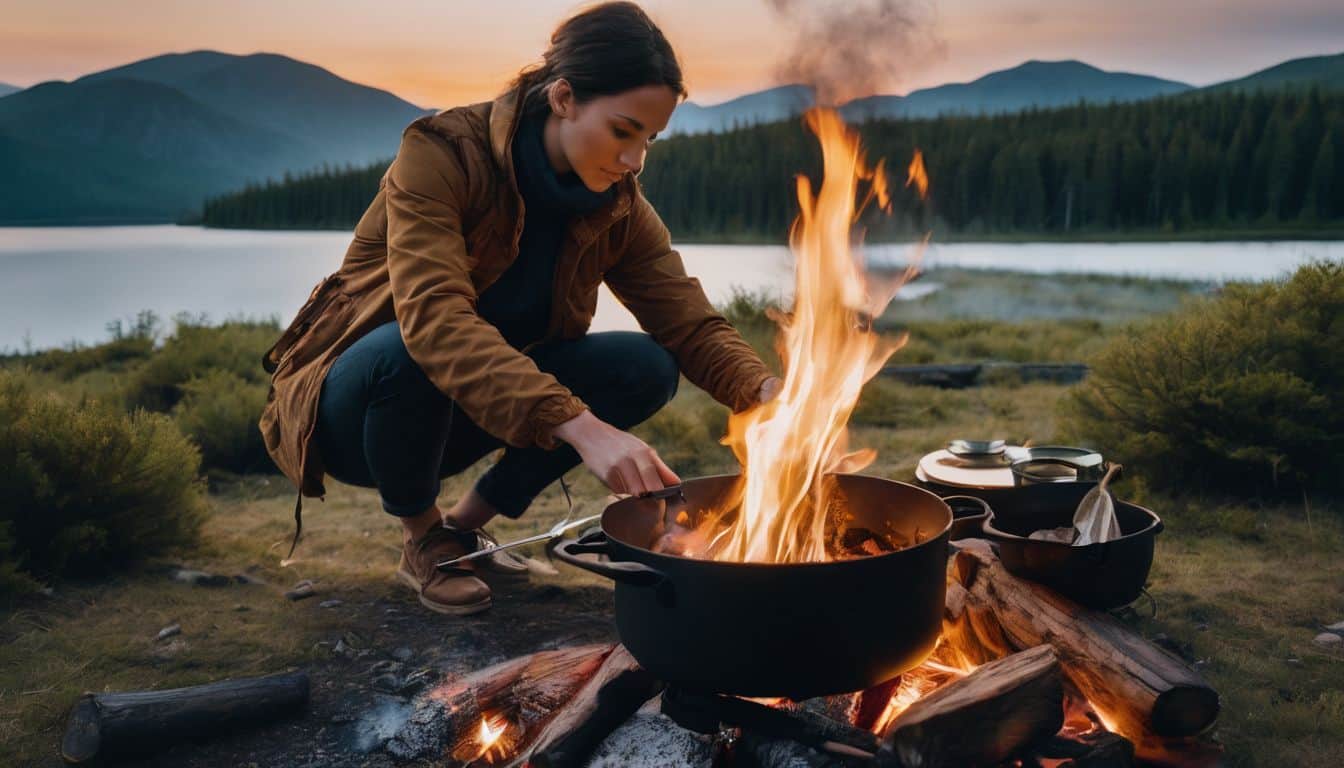You know, sometimes a random thought catches you off guard. For me, it was pondering life without electricity. Thinking hard about it, I unearthed the surprising fact that close to 1.2 billion people across our globe are living this reality day in and day out.
Intriguing isn’t it? So I felt compelled to gather some key strategies for surviving, no scratch that – thriving even when power supply is not an option! Ready to bring out your inner survivalist? Let’s delve in together!
Key Takeaways
- Surviving without electricity is challenging but possible by understanding the basics of creating energy, keeping your home functional, and finding alternative energy sources.
- Stocking up on essential items like batteries, water purification systems, fuel, backup generators, sun protection, food preservation systems, toiletries, medication, tools can help you thrive in a world without electricity.
- Learning to eat foods with long shelf life such as canned foods, dried foods, dehydrated foods and jarred foods is crucial for sustaining yourself during power outages or emergencies.
- Other important strategies include having an emergency kit with necessary supplies and maintaining a vehicle maintenance kit for off-grid situations.
Understanding the Basics of Surviving in a World Without Electricity

Living without electricity isn’t easy. I know because I’ve learned about it and tried it myself. First, you need the right skills to create energy. You must learn how to start a fire for warmth or cooking.
There are also safe ways to store food and water without a fridge or electric pump.
Next, think about keeping your home working well. What happens when there’s no power? You can’t use your stove, TV, computer, or even charge your phone! That’s why it’s best to unplug them during a big power outage.
This stops them from getting hurt by surprise power surges.
Lastly, knowing where else you can get energy makes life easier in an electricity-free world. The village of Sadikpur showed me this truth firsthand with their alternative energy solutions – so smart! Living without electricity is tough but possible if we understand the basics thoroughly.
Stocking Up on Essential Items
To prepare for a world without electricity, it is crucial to stock up on essential items such as batteries, a water purification system, fuel, a back-up generator, sun protection, food preservation system, toiletries, medication, tools and an emergency kit.
Batteries
I love batteries. They give a power supply when there’s no electricity. It’s like having portable energy in your pocket! That electric power can run lights, radios and many other things.
Did you know the first battery came to life in 1799? Alessandro Volta was the man who made it happen. That makes batteries older than most modern devices we use for power! I have a stash of Nickel Cadmium (NiCd) batteries at my place.
They don’t cost much and go on for long hours before dying out. So think about getting some too!
Water Purification System
Clean water is a must-have. That’s where the water purification system comes in play. I have an Outback gravity filter on my essential items list. This clever tool works great in emergencies and doesn’t need power or pressure to work well.
It is one of many off-grid ways to make sure your drinking water is safe. You can also boil water or try DIY distillation methods if you want more choices. Polish wizards from Toruń made a nifty gadget too, it purifies and takes salt out of water without needing energy or pressure! Isn’t that cool? These systems are all about giving us access to clean, safe drinking water, no matter what happens around us.
Fuel
When it comes to surviving in a world without electricity, having fuel is essential. Fuel can be used for cooking and heating when there is no electricity available. Renewable energy sources like biofuels, natural gas, and propane can be great alternatives to traditional fossil fuels.
Electric generators are also useful as they provide a source of power when the grid goes down. By stocking up on fuel and considering renewable options, we can ensure energy independence and security even in challenging times.
Back-Up Generator
A back-up generator is an essential item to have during a power outage. It provides a reliable source of electricity when the grid power fails, helping you stay comfortable and prepared.
Unlike portable generators, a home backup generator is more dependable and can handle the increased demand for power. It’s important to remember that running a generator improperly can be dangerous due to carbon monoxide emissions, so always follow safety guidelines.
Consider investing in a battery backup system or exploring alternative options like solar power with battery storage for added reliability.
Sun Protection
Sun protection is crucial, even in a world without electricity. During a power outage or emergency situation, it’s still important to take care of your skin and protect it from harmful UVB rays.
Sunscreen with a high sun protection factor (SPF) can help prevent sunburns and damage caused by the sun. Applying sunscreen should be part of your morning routine, regardless of whether there is electricity or not.
So make sure you stock up on sunscreen lotion or sunblock to keep your skin safe from the sun’s rays, even when things are tough.
Food Preservation System
Preserving food without electricity is essential for survival. There are simple and effective methods to ensure your food stays fresh for a long time. One way is by freezing it, which can be done using dry ice or ice blocks in an insulated cooler.
Canning is another option, where you seal the food in jars with airtight lids after cooking it. Dehydrating is also a great method that removes moisture from the food, preventing bacteria growth.
Salt preservation, vacuum packing, and smoking meat are traditional ways of preserving food without electricity. By learning these techniques and stocking up on essential items like canned foods and dried goods, you can have a reliable source of sustenance even when power is unavailable.
Toiletries
Toiletries are important items to have in a world without electricity. They include things like soap, shampoo, toothpaste, and toilet paper. These personal care items help us stay clean and hygienic even when we don’t have access to modern amenities.
Without electricity, it can be challenging to wash ourselves properly or take care of our oral health. That’s why stocking up on toiletries is crucial for survival. Having these bathroom supplies can bring a sense of normalcy and comfort during difficult times.
So, remember to include toiletries along with other essential items when preparing for a situation without electricity.
Medication
Having an ample supply of medication is crucial for managing your health during a power outage or in a world without electricity. It’s recommended to have at least a week’s worth of prescription drugs and nonprescription medications on hand.
To determine exactly what you should stock up on, consult with your healthcare professional. They can provide guidance based on your individual health needs and conditions. Remember to store medications in a cool, dry place away from direct sunlight to maintain their effectiveness.
It’s also important to regularly check the expiration dates of medications and replace them as needed. Don’t forget about over-the-counter medications like pain relievers and cough and cold medicines, which are essential in case of emergencies.
Tools
Having the right tools is crucial for surviving in a world without electricity. One important tool to have is a water purification system, which can help ensure that you have access to clean and safe drinking water.
Another essential tool is a backup generator, which can provide power during electricity outages and keep your essential devices running. Stocking up on batteries is also important, as they can power devices like flashlights, radios, and communication devices when the grid goes down.
And don’t forget about fuel storage – having enough fuel on hand will enable you to power generators, vehicles, and other equipment necessary for survival. Lastly, sun protection is key in a world without electricity since we rely more on natural light sources.
Emergency Kit
In an emergency, it’s important to have an emergency kit stocked with essential items. This includes things like batteries, water purification systems, fuel, a back-up generator, sun protection, and food preservation systems.
These items will help you stay safe and comfortable during a power outage or other emergencies. Don’t forget to include water, easy meals and snacks, flashlights, batteries, first aid supplies,and a battery-powered radio in your emergency kit.
Having these supplies ready can make all the difference when disaster strikes.
Vehicle Maintenance Kit
The vehicle maintenance kit is an important part of preparing for a world without electricity. As a survival enthusiast, I always keep my car repair essentials on hand in case of emergencies.
This includes an automotive toolkit with all the necessary tools, such as wrenches and pliers, to fix any mechanical problems that may occur. Additionally, I make sure to have a car cleaning supplies like wet wipes and rags for cleaning up after resolving these issues.
It’s also crucial to have a gallon of drinking water in the vehicle emergency kit, as staying hydrated is essential during power outages. By having a well-stocked vehicle maintenance kit, I can ensure that my car remains in good working condition even during off-grid situations.
Learning to Eat Foods with Long Shelf Life
In order to survive in a world without electricity, it is crucial to learn how to eat foods with long shelf life.
Canned Foods
Canned foods are a great option for survival situations without electricity. They have a long shelf life, so you can stock up on them and not worry about them going bad quickly. It’s also important to note that canned foods are considered the safest form of food packaging, as they protect against bacteria and other contaminants.
Plus, when it comes to certain vegetables, canning actually helps make the fiber more soluble and beneficial for our bodies. Another advantage of canned foods is that they are affordable options for long-term food storage.
Just remember that high-acidity canned foods, like tomatoes and fruits, taste best when consumed within 12 to 18 months. So be sure to rotate your stock regularly!
Dried Foods
Dried foods are a great option when it comes to survival situations. They have a long shelf life and don’t need refrigeration. By reducing the moisture levels, dried foods become lightweight and easy to store.
You can find a variety of dried fruits, vegetables, and even ready-to-eat meals that can last for a long time. Canned meat and beans are also examples of survival foods with a long shelf life.
If properly stored, freeze-dried fruits, vegetables, and meals in large cans can last up to 20 to 30 years. So having some dried foods in your emergency supply is definitely a smart idea for any survival enthusiast like me!
Dehydrated Foods
Dehydrating food is a great way to have a long-lasting food supply without electricity. It’s easy and safe too. You can dehydrate food by drying it in the sun or using air or a wood stove.
The best part is, dehydrated food stays good for a really long time, so you’ll always have something to eat even if there’s no power. Plus, dehydrating your own food gives you control over what goes into it and helps reduce waste.
So, it’s definitely an important skill to have for surviving without electricity.
Jarred Foods
In a world without electricity, learning to eat foods with a long shelf life is crucial. One option for sustaining yourself during this time is by stocking up on jarred foods. These preserved foods are great pantry staples as they have a long-lasting shelf life and do not require refrigeration.
Canned vegetables, fruits, and meats can provide essential nutrients while lasting for an extended period. Additionally, other jarred options like pickles or jams can add flavor to your meals.
When considering food preservation in a world without electricity, don’t forget to include jarred foods in your emergency food supplies.

Finding Ways to Collect and Store Water
Water is essential for survival, especially in a world without electricity. Here are some ways to collect and store water:
- Rainwater harvesting: Collect rainwater from rooftops using gutters and downspouts. Store it in clean containers for later use.
- Water conservation: Use water wisely and avoid wastage. Fix any leaks or drips to conserve as much water as possible.
- Off-grid living: Invest in a well or a borehole to access groundwater for your water needs.
- Sustainable water management: Implement systems like graywater recycling to reuse water from sinks, showers, and laundry for non-drinking purposes.
- Water purification methods: Learn how to purify water using methods such as boiling, chemical disinfection, or filtration.
Using Alternative Lighting
When electricity is unavailable, it’s important to have alternative lighting options such as candles, oil lamps, solar lights, lightsticks, and lanterns.
Candles
Candles are incredibly versatile and can be a lifesaver during a power outage. Not only do they provide light, but they can also add a pleasant aroma to your surroundings. In addition to that, candles can even be used for cooking food and masking unpleasant odors.
When it comes to survival situations, makeshift options like using sardines, crayons, bottles, bacon, or kindling as candle wicks can come in handy. The best part is that candles are affordable, easy to store, and don’t require electricity.
So whether you’re looking for an alternative lighting source or simply want to create a cozy atmosphere during a blackout, candles are definitely worth considering. Just make sure you choose long-lasting ones that provide enough light for your needs.
Oil Lamps
Oil lamps are a great alternative lighting source when there is no electricity. They use an oil-based fuel, such as kerosene, to provide steady and long-lasting illumination. You can burn any combustible fuel in oil lamps, but it’s safer to use less volatile options like kerosene.
Saltwater lamps are another option that can reduce the burning of crude oil and coal. Using oil lamps instead of electricity not only provides a cost-effective solution for lighting but also makes you feel prepared for off-grid situations.
Oil lamps are considered a sustainable lighting option by preppers and survivalists alike. So, keep some oil lamps handy for portable and reliable light during emergencies or when living without electricity!
Solar Lights
Solar lights are a great alternative for lighting when there is no electricity. They don’t need any energy to work, so you can save money and help the environment at the same time.
Solar outdoor lighting is also really efficient and can light up your spaces effectively. When there’s a power outage, rechargeable solar lights can be relied upon as a source of emergency lighting.
Investing in solar-powered electricity can improve access to energy worldwide and have a positive impact on the environment by reducing the use of other sources of energy.
Lightsticks
Lightsticks are a great alternative lighting option to consider when facing a world without electricity. These chemiluminescent devices emit light without needing any energy source, making them efficient emergency lights.
They have a long shelf life of 4-5 years, so you can stock up on them for future use. Lightsticks are perfect for emergencies because they provide a reliable and long-lasting light source.
Whether you need illumination during power outages or while camping, lightsticks are an essential item to have in your survival kit.
Lanterns
Lanterns are essential for providing alternative lighting in a world without electricity. Oil lamps, like kerosene lanterns, are great options to consider as they can provide sufficient light.
Another option is solar lanterns, which use the power of the sun to generate light and usually come with a built-in charger for your devices. LED lanterns are another popular choice due to their energy efficiency and longer battery life.
It’s important to have reliable source of light during dark times, especially when traditional electricity is not available. So, make sure you have a few lanterns on hand in your survival kit.
Utilizing Alternative Heat Sources
To stay warm during a power outage, consider using alternative heat sources such as a wood stove, pellet stove, or biomass cook stove.
Wood Stove
Wood stoves are a crucial resource for heating in a world without electricity. They use wood as fuel, which is renewable and sustainable. You can find EPA-certified wood stoves that have the latest technology for efficient and environmentally friendly heating.
These advancements in wood stove technology not only improve air quality but also reduce greenhouse gas emissions. There are even wood pellet stoves available that don’t need electricity to operate.
So, with a wood stove, you can stay warm and cozy without relying on traditional electrical heating systems.
Pellet Stove
Pellet stoves are a great option for heating your home during a power outage. They don’t need electricity to work, which makes them reliable in emergencies. These stoves use wood pellets as fuel to produce heat.
Unlike traditional wood stoves, pellet stoves use an electric fan for combustion. This fan-assisted process is cleaner and more efficient. So, if you’re looking for an eco-friendly and energy-efficient heating option that doesn’t rely on electricity, consider getting a pellet stove.
It’s a reliable heat source that can keep you warm when the power goes out.
Biomass Cook Stove
Using a biomass cook stove can be a practical and sustainable way to cook and stay warm in a world without electricity. Biomass refers to organic materials, such as wood, crop residues, or animal dung, that can be burned for energy.
These stoves have been used since ancient times for cooking and heating purposes. They work by burning biomass fuel to produce heat, which can then be used for cooking food or heating water.
One advantage of biomass cook stoves is that they use renewable energy sources, unlike fossil fuels like coal or oil. They also have lower emissions compared to traditional wood-burning stoves, reducing indoor air pollution.
Staying Cool without Electricity
Stay cool during a power outage with fans, cross ventilation, evaporative cooling, and shade. Discover more tips to beat the heat without electricity in our blog post!
Fans
Staying cool without electricity can be a challenge, but fans can help. Battery-powered fans are a great option during a power outage because they can keep temperatures down. They provide a source of airflow, which is essential for staying cool when the air conditioning isn’t working.
Portable travel fans are also useful in areas without electricity. They are compact and easy to carry, making them convenient for on-the-go cooling. Additionally, you can use fans to create an evaporative cooling effect by hanging soaked sheets in windows or doorways.
This helps lower the temperature and provides relief from the heat. Just remember to close doors to rooms you’re trying to keep cool so that the cooler air doesn’t escape!
Cross Ventilation
Cross ventilation is a method of staying cool without electricity. It takes advantage of natural airflow in a home to enhance the cooling processes of convection, radiation, and perspiration.
By opening windows and doors strategically, you can create a pathway for fresh air to enter your house while pushing out warm air. This technique is especially helpful during a summer power outage when you don’t have access to air conditioning.
Cross ventilation allows you to cool your house naturally and comfortably without relying on electrical appliances.
Evaporative Cooling
Evaporative cooling is a way to stay cool without electricity. It’s a system that can lower temperatures by more than 23 degrees. This method is often used in places where there is limited or no access to electricity and where they need better ways to store vegetables.
MIT has even developed a passive cooling system that doesn’t need any electricity at all. It’s an environmentally friendly and sustainable way to control the climate and keep things cool.
Evaporative cooling is a great option for surviving in a world without electricity because it doesn’t require any energy and can help you beat the heat.
Shade
Shade is an important factor in staying cool without electricity. It blocks the sunlight from coming in and heating up an area. You can create shade by planting trees or using other structures that provide cover.
Strategically placing trees around your home can help keep it cooler, while also allowing for natural airflow. Increasing shade in a community can even help reduce the heat island effect and make us more resilient to heat waves.
So, finding ways to incorporate shade into our surroundings is essential for surviving without electricity.
Cooking with Alternative Methods
There are several alternative methods for cooking without electricity, such as using solar ovens, rocket stoves, and portable stoves.
Solar Ovens
Solar ovens are a great cooking option when you don’t have electricity. They use the power of the sun to cook food and boil water. Solar ovens are portable and can be used in isolated areas without access to power or fuel sources.
They are also beneficial for survival situations and preparedness. Solar ovens help reduce reliance on coal or firewood for cooking, which is important for rural communities that may struggle with environmental inequities caused by climate change.
With a solar oven, you can cook your meals using renewable energy, making it an eco-friendly and sustainable choice. Plus, solar ovens provide fuel-free and smoke-free cooking, baking, and water decontamination.
Rocket Stoves
Rocket stoves are a great alternative cooking method for survival situations. They are commonly used in areas where there is limited access to electricity. In fact, over 1 billion people rely on rocket stoves for cooking because they don’t have electricity.
Rocket stoves are designed to burn fuel more efficiently, which means you can use less wood. This is important when resources are scarce. Not only that, but rocket stoves also emit less smoke and emissions compared to traditional cooking methods.
This is good for the environment and your health. Plus, rocket stoves generate high heat and are easily portable, making them perfect for off-grid situations or when you need to cook outdoors.
Portable Stoves
Portable stoves are a great alternative for cooking when there is no electricity. They are small, easy to transport, and run on bottled gas or butane. These stoves can be just as powerful as a regular gas or electric stove in your kitchen.
In case of an emergency, it’s important to have an alternative cooking method even if you have a regular stove that runs on gas. Portable stoves are especially popular among preppers and those preparing for survival situations because they provide a reliable way to cook food without relying on electricity.
So whether you’re camping or facing a power outage, having a portable stove can make all the difference in being able to prepare meals efficiently and easily.
Considering Alternative Toilet Systems
Composting toilet, incinerating toilet, outhouse toilet – there are plenty of options when it comes to staying clean during a power outage. Read on to learn more about these alternative methods and how they can improve your situation.
Composting Toilet
Composting toilets are a sustainable and environmentally friendly alternative to traditional urban sanitation systems. They don’t require any water to function, which makes them perfect for off-the-grid living.
Instead of using water to flush waste away, composting toilets use natural processes of decomposition and evaporation to recycle human waste. This onsite treatment of sewage not only eliminates the need for electricity but also recycles nutrients from the waste into useful fertilizer.
Composting toilets are a fantastic option for those looking for sustainable waste management solutions in a world without electricity.
Incinerating Toilet
Incinerating toilets are a great alternative to traditional sewage disposal methods. They are often considered “pollution-free” and have many advantages. Unlike composting toilets, incinerating toilets don’t require you to tend to the compost.
They can run on electricity or other energy sources. One of the biggest benefits of incinerating toilets is that they don’t need water for flushing, which helps reduce water consumption and our ecological footprint on the environment.
So if you’re looking for a sustainable and eco-friendly toilet option, consider using an incinerating toilet in your off-grid living situation.
Outhouse Toilet
I find that outhouse toilets are a great option for off-grid living, especially when you don’t have access to electricity or running water. These types of toilets are designed to be self-contained and require very little maintenance.
They can be built with simple materials and are environmentally friendly since they don’t use any water. Outhouse toilets also help conserve limited resources like fuel, making them a sustainable choice for alternative sanitation systems.
So if you’re looking for an eco-friendly and low-maintenance toilet option for your off-grid lifestyle, consider building an outhouse toilet.
Honey Bucket
The Honey Bucket is a portable toilet that can be used in places without electricity. It’s an eco-friendly and cost-effective alternative to traditional indoor plumbing systems. The system consists of a 5-gallon plastic bucket lined with a plastic bag and a toilet seat on top.
This simple setup makes it easy to collect waste and dispose of it properly. The Honey Bucket is commonly used in Native Alaskan villages and can also be used as a temporary solution in emergency situations.
So, if you find yourself in need of a sustainable waste management solution when there’s no access to electricity, the Honey Bucket is definitely worth considering.
Septic Tank
Alternative toilet systems are an important consideration when living off the grid. These systems do not rely on public utilities and are not connected to centralized sewer or piped-in water.
Green builders often explore alternative methods of waste disposal, including greywater systems and composting toilets. In certain cases, aerobic sewage treatment systems or composting toilets can be better alternatives to traditional septic systems.
Research has been conducted on septic tank additives, outlet filters, and liners by organizations like the Massachusetts Alternative Septic System Test Center. If you’re looking for off-grid toilets suitable for cabins or remote locations, it’s worth exploring these alternative options.
Making the Most of Daylight and Finding Entertainment
In a world without electricity, making the most of daylight is essential. Daylight hours are limited, so it’s important to maximize their use for daily tasks and entertainment. During the day, prioritize activities that require natural light, such as cooking, cleaning, and reading.
Take advantage of sunny weather by hanging clothes outside to dry or working on outdoor projects.
When it comes to finding entertainment without electricity, there are plenty of options. Instead of relying on television or stereo systems, explore alternative forms of entertainment like board games, card games, puzzles, or reading books.
These activities can be enjoyed individually or with family and friends.
Remember that living without electricity requires adapting to a simpler lifestyle. Embrace the opportunity to connect with others through conversation and spend quality time together.
Additionally,”11″ winter power outage survival tips from Consumer Reports suggests preparing ahead by having non-electronic sources of entertainment available.
In summary,
– Make the most of daylight by prioritizing tasks that require natural light.
– Find alternative forms of entertainment like board games and reading books.
– Embrace a simpler lifestyle by engaging in conversation and spending quality time with loved ones.
Follow these tips to excel in a world without electricity while staying entertained during daylight hours
Conclusion on Surviving in a World Without Electricity
In conclusion, surviving in a world without electricity requires essential items like batteries, water purification systems, and backup generators. Learning to eat foods with long shelf life and finding ways to collect and store water are also crucial.
Using alternative lighting, heat sources, and cooking methods can help excel in this situation. By considering alternative toilet systems and making the most of daylight for entertainment, one can improve their situation during a power outage.
Remember to prioritize needs, conserve energy, and be prepared for emergencies without electricity.
FAQs on Surviving in a World Without Electricity
1. How can I survive in a world without electricity?
To survive in a world without electricity, you can: gather food and water supplies, learn basic survival skills like starting a fire and finding shelter, create a community support system, rely on renewable energy sources such as solar power or wind energy, and adapt to the changing environment.
2. What are some essential items to have during an electricity outage?
Some essential items to have during an electricity outage include: flashlights with extra batteries, non-perishable food that doesn’t require cooking or refrigeration, plenty of water for drinking and hygiene purposes, blankets or warm clothing for colder temperatures, and important documents like identification and medical records.
3. How long can I expect a power outage to last?
The duration of a power outage can vary greatly depending on the cause. It could range from just a few minutes to several days or even weeks in extreme cases. It’s always best to be prepared for longer durations by having enough supplies on hand.
4. Are there any dangers associated with living without electricity?
Living without electricity may pose certain risks such as lack of access to medical equipment/devices that require power, limited communication options if cell towers are down as well as potential safety hazards from using alternative heat sources or lighting methods. It is important to take appropriate precautions when adapting to life without electricity.
5. Can alternative energy sources provide enough power for all my needs during an emergency situation?
Alternative energy sources like solar panels or small generators can provide sufficient power for basic needs such as powering lights and charging electronic devices; however they may not be able handle larger appliances like refrigerators or air conditioners unless you have advanced systems installed specifically for those purposes.





Leave a Reply